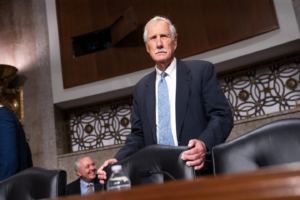In a landmark decision, a federal judge in Washington ruled on Saturday that President Donald Trump’s attempt to oust the head of a federal watchdog agency was unlawful. The ruling, which reinforces the independence of government oversight agencies, sets the stage for a potential Supreme Court battle over executive authority and accountability.
Legal Battle Over the Office of Special Counsel
U.S. District Judge Amy Berman Jackson sided with Hampton Dellinger, the head of the Office of Special Counsel (OSC), after he was abruptly dismissed by President Trump. The OSC plays a critical role in protecting federal employees from unlawful personnel actions, such as retaliation against whistleblowers.
Dellinger had filed a lawsuit challenging his termination, citing a federal statute that states the special counsel can only be removed by the president for “inefficiency, neglect of duty, or malfeasance in office.” Jackson, who was appointed by President Barack Obama, quickly reinstated Dellinger while his case proceeded through the courts.
Judge’s Ruling: Upholding Oversight and Whistleblower Protections
In her decision, Judge Jackson rejected the Trump administration’s argument that the president should have unrestricted authority to replace the special counsel. She emphasized that removing the head of the OSC without valid cause would undermine the agency’s ability to protect federal employees from political retaliation and misconduct.
“The Special Counsel is designed to withstand the shifting political landscape and ensure that government employees—regardless of their political affiliations—are protected from unlawful treatment,” Jackson wrote. “Stripping this office of its independence would create a chilling effect, discouraging whistleblowers from coming forward.”
Trump Administration’s Pushback and Supreme Court Implications
Following the ruling, the Department of Justice (DOJ) swiftly filed an appeal, signaling a likely showdown in the Supreme Court. Acting Solicitor General Sarah Harris argued that the lower court’s decision had overstepped constitutional boundaries by restricting the president’s authority to shape his administration.
“The court’s decision crosses a constitutional red line,” Harris wrote in legal filings. “The president must have the ability to set the agenda for executive-branch agencies, particularly in the crucial first days of a new administration.”
This case has already reached the Supreme Court once before on an emergency basis, where the justices temporarily allowed Dellinger to remain in office while legal proceedings continued.
Broader Implications for Federal Employees and Whistleblower Protections
The ruling is significant because it comes amid broader efforts by the Trump administration to restructure the federal workforce. The administration has pursued mass terminations of probationary employees and sought to streamline government agencies by cutting jobs and canceling contracts.
Dellinger, who has been a vocal advocate for government accountability, celebrated the court’s decision.
“I am grateful that the court has reaffirmed the protections Congress put in place for this position,” Dellinger said in a statement. “Federal employees, especially whistleblowers, must have confidence that they can report wrongdoing without fear of unlawful retaliation.”
The OSC is responsible for enforcing the Hatch Act, which limits the partisan political activities of federal employees. Dellinger’s removal had sparked concerns that political interference was at play, particularly as Trump administration officials had faced scrutiny for using their government positions to advocate for policy agendas in potential violation of the law.
What’s Next?
With the DOJ appealing the ruling, the legal battle over executive power, government oversight, and whistleblower protections is far from over. If the case reaches the Supreme Court, it could have lasting implications on the balance of power between the presidency and independent federal agencies.
As the case unfolds, it remains to be seen whether the judiciary will continue to uphold the independence of government watchdog agencies or grant the executive branch broader authority to reshape oversight institutions.




